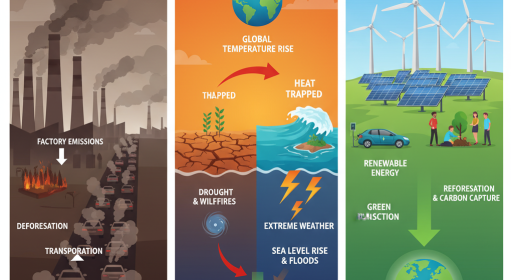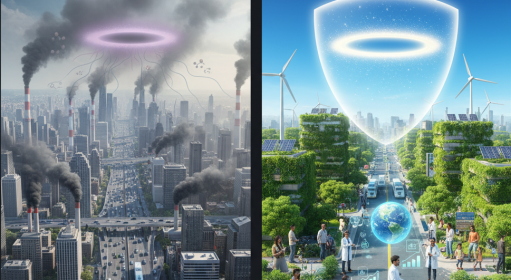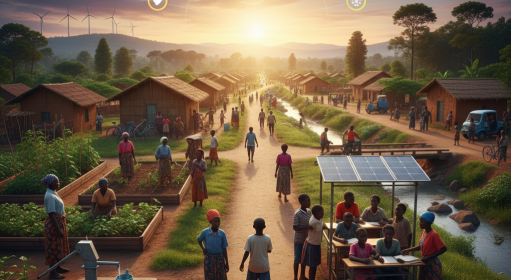Climate change represents one of humanity’s greatest challenges—long-term shifts in global temperatures and weather patterns primarily caused by human activities. While Earth’s climate has naturally fluctuated throughout history, the current rapid changes are unprecedented in both speed and scale.
This matters because our generation will experience the most severe consequences of climate change, but we also hold the power to implement solutions. Let’s examine the science behind this global phenomenon.
What Causes Climate Change?
Climate change results from both natural processes and human activities:
Natural Factors:
- Volcanic eruptions (temporary cooling from aerosols)
- Solar radiation variations
- Earth’s orbital changes (Milankovitch cycles)
Human Activities (Primary Drivers):
- Burning fossil fuels (coal, oil, gas) → CO₂ emissions
- Deforestation → Reduced carbon absorption
- Industrial processes → GHG emissions
- Agriculture → Methane from livestock
The Greenhouse Effect: How It Works
Greenhouse gases (GHGs) like CO₂, methane (CH₄), and nitrous oxide (N₂O) act like a blanket around Earth:
- Sunlight passes through the atmosphere
- Earth’s surface absorbs and re-emits heat
- GHGs trap some of this heat, warming the planet
Key Statistics:
- CO₂ levels: 420 ppm (vs. 280 ppm pre-industrial)
- Global temperature: +1.1°C since 1880
- Last decade (2011-2020): Hottest on record
Climate vs. Weather – Critical Differences
Weather:
- Short-term atmospheric conditions
- Changes hourly/daily
- Examples: Today’s rainstorm, this week’s heatwave
Climate:
- Long-term weather patterns (30+ years)
- Regional/global averages
- Examples: Mediterranean climate, monsoon seasons
Analogy: Weather is your mood today; climate is your personality.
The Evidence for Climate Change
Scientists use multiple lines of evidence from:
- Ice core samples (showing ancient climate)
- Satellite measurements
- Temperature records
- Ocean data
Undeniable Proof:
✔ Rising Temperatures: +1.1°C since pre-industrial times
✔ CO₂ Levels: Highest in 800,000 years (50% increase)
✔ Melting Ice:
- Arctic summer ice declined 40% since 1979
- Glaciers retreating worldwide
✔ Rising Seas: +3.7 mm/year since 2006
✔ Extreme Weather: - 15% more intense hurricanes
- Longer wildfire seasons
- More frequent heatwaves
Visual Evidence: NASA’s Climate Change in 60 Seconds
Why This Matters for Our Future
Projected Impacts:
- Ecosystem Collapse: 30% species risk extinction
- Food Security: Crop yields could drop 30% by 2050
- Health Risks: Heat stress, disease expansion
- Economic Costs: $54 trillion by 2100 if unchecked
Tipping Points:
- Amazon rainforest dieback
- Greenland ice sheet collapse
- Permafrost methane release
Call to Action: What You Can Do
- Reduce Energy Use: Switch to LEDs, unplug devices
- Sustainable Transport: Walk, bike, use public transit
- Eat Climate-Smart: More plants, less meat
- Get Involved: Join environmental groups, contact policymakers




